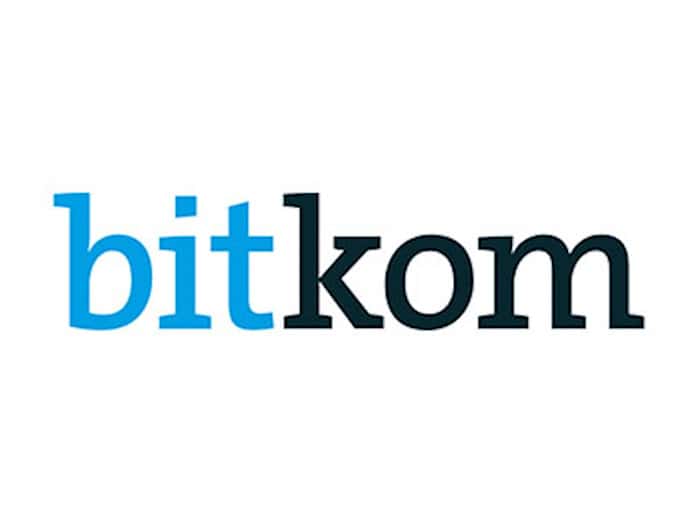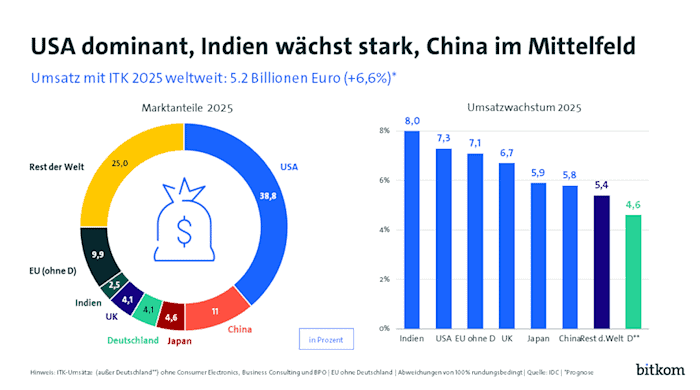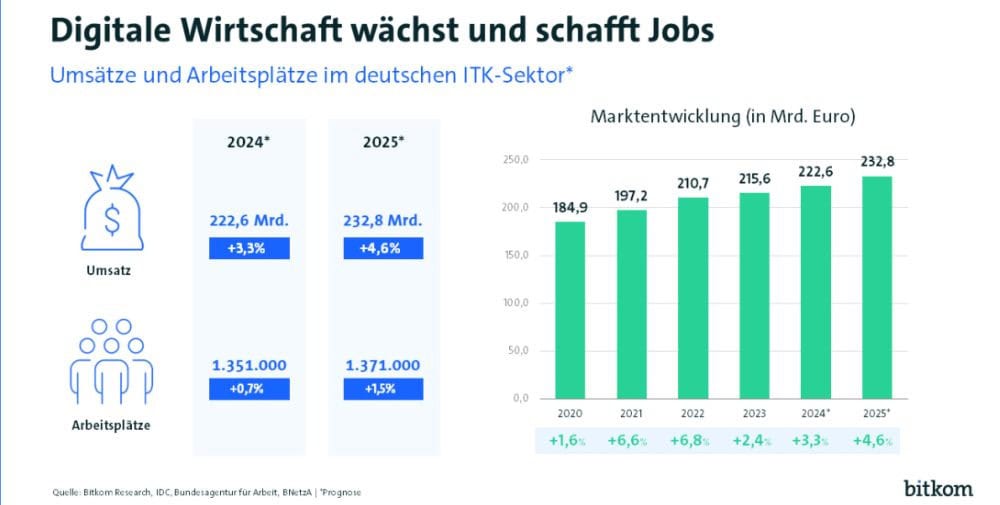
“The digital economy offers a ray of hope in difficult times, increases turnover and creates new jobs. The ICT sector is now Germany’s largest industrial employer. Business for most companies in the IT and telecommunications sector is forecast to be positive in 2025. The direction in IT is right,” says Bitkom President Dr. Ralf Wintergerst. “Politicians should do everything they can to increase the pace of growth.”
KI with rapid growth of 43 percent
Information technology continues to be the most important growth driver. According to the latest forecast, 158.5 billion euros will be spent on IT in Germany this year, which corresponds to an increase of 5.9%. The software business in particular is once again growing strongly (up 9.8% to 51.1 billion euros). The ongoing boom in artificial intelligence stands out in particular: business with AI platforms, on which AI applications can be developed, trained and operated, is growing rapidly by 43% to EUR 2.3 billion. “The next federal government must seize the momentum and turn Germany into an AI country,” emphasizes Wintergerst. Collaboration tools for collaboration and mobile working in companies are also growing strongly: by 12% to 1.4 billion euros. Security software increased by 11 percent to 5.1 billion euros.
Double-digit growth rates are also expected for cloud services, which will increase by 17% to 20 billion euros. According to Bitkom, sales of IT services as a whole will increase by 5.0% to 53.8 billion euros in 2025.
Turnover with IT hardware on the rise
The market for IT hardware is growing in almost all segments. According to forecasts, the hardware market as a whole is expected to grow by 3.3% to 53.7 billion euros in 2025. The biggest growth driver is once again the Infrastructure-as-Service segment, i.e. rented servers, network and storage capacities. This segment will grow by 24.4% to EUR 6.2 billion. Wearables will grow by 5.1% to EUR 2.6 billion and mobile PCs by 4.5% to EUR 6 billion. For the fifth year in a row, sales of classic consumer electronics remained clearly in negative territory. After a drop of 5.8% last year, Bitkom expects a further decline in sales of 7.5% to EUR 7.2 billion in 2025. “The consumer electronics business suffers particularly badly in times of high inflation and economic uncertainty – many households are watching their money and often forego larger purchases,” emphasizes Bitkom President Wintergerst.
Telecommunications: investments in infrastructure picking up again
In the telecommunications market, Bitkom expects growth of 1.8% to EUR 74.3 billion in 2025. The largest share of this will come from the telecommunications services business, which will account for 53.5 billion euros, an increase of 1.4%. Investments in telecommunications infrastructure rose by 3.5% to EUR 8.0 billion, while sales of end devices also increased by 2.7% to EUR 12.8 billion. “Network operators are massively accelerating the expansion of gigabit networks and mobile communications,” says Wintergerst.
Investment by ICT companies also remains high overall. For example, 17% want to increase their investments in 2025, while 59% want to keep them constant. However, 23% want or need to reduce their investments. The money will flow primarily into software and research and development. Despite the good business prospects this year, it is clear that not all companies will be able to benefit from the predicted market growth. Small and medium-sized companies in particular can only partially benefit from the general growth.
Germany’s digital market ranks 4th in a global comparison
According to the forecast, global IT and telecommunications sales will increase by 6.6% to 5.2 trillion euros in 2025. India will record the highest growth this year with an increase of 8 percent, followed by the USA with projected growth of 7.3 percent. The EU (excluding Germany) is expected to achieve growth of 7.1 percent, followed by the UK (6.7 percent) and Japan (5.9 percent). Sales growth of 5.8% is forecast for China. Germany lags behind with its 4.6% growth in ICT sales.
When looking at the international markets, the USA will maintain its dominant position and achieve a global market share of 38.8% in 2025. It is followed at a considerable distance by China (11.0%), Japan (4.6%) and – together with the UK – Germany (4.1% each) in fourth place. India has a global market share of 2.5%. The EU, excluding Germany, accounts for 9.9% of the global ICT market.

Germany needs a re-start after the general election
Wintergerst: “It is important that the future federal government gets to work quickly after the elections and focuses on digital policy. We need less regulation and more investment and innovation instead.” Firstly, in order to boost the economy, more capital needs to be mobilized for companies and the shortage of IT specialists needs to be alleviated. Secondly, government structures need to be overhauled and administrations need to be consistently digitalized with modern registers and digital identities. And thirdly, a digital ministry is needed in the next legislative period: “Real progress will only be achieved if there is a driver for digital issues within the next federal government. The time is ripe for an independent digital ministry that bundles digital policy responsibilities and effectively drives digital policy forward,” emphasizes Bitkom President Wintergerst. “This ministry should focus on the central tasks and cross-cutting issues of digital policy and must not be an appendage of another ministry.” And fourthly, Germany must become more digitally sovereign and free itself from one-sided dependencies. It needs its own capabilities in key technologies such as microelectronics, IT and cyber security, AI, industrial metaverse and quantum computing in order to take a leading position on the global markets. Wintergerst: “The next German government must prove that it is willing and able to act, recognize, tackle and solve challenges and problems – especially in the digital sphere. Digital policy must become a priority in the coming legislative period.”
– – – – – –
Further links
👉 www.bitkom.org
Graphic: Bitkom





